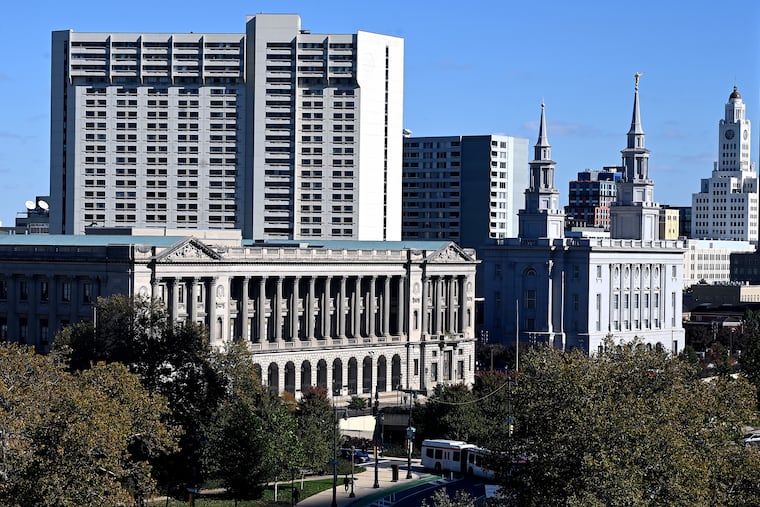Developer pulls out of Benjamin Franklin Parkway redevelopment project
City officials say that plans to relocate the African American Museum onto the Parkway and add a boutique hotel in the former Family Court building are still moving forward.

A Philadelphia-based developer coleading the transformation of the Family Court building on the Benjamin Franklin Parkway has pulled out of the project, citing a shift in its investment strategy and complicating the future of the ambitious project, which includes the relocation of the African American Museum.
National Real Estate Advisors told The Inquirer on Monday that the difficult construction financing environment partly led the company to decide against taking part in the plan to redevelop the historic building at 18th and Vine Streets into a hotel and the museum. The developer, one of two involved in the project, had also planned a parking garage and 30-story residential building at a neighboring site.
“Despite this decision, the project continues,” said Jeffrey Kanne, president and CEO of National Real Estate. “We are currently facilitating the transition of our role to the other development team members who are in negotiations to secure an alternative capital partner.”
Mayor Cherelle L. Parker said the project and the relocation of the African American Museum, which the city has committed $50 million to support, would still move forward. The other developer, Washington D.C.-based Frontier Development & Hospitality Group, remains involved, too, but it was not immediately clear what National Real Estate Advisors’ withdrawal would mean for the timeline or overall feasibility of the plan.
Parker said Monday that the multipronged effort, which also includes an expansion of the Central Branch of the Free Library, remains a priority. She said the city and the Philadelphia Industrial Development Corp. (PIDC), the city’s public-private economic development corporation, are proceeding with next steps, including a “predevelopment” feasibility study.
“This is what’s not changing: the city’s complete and total commitment to this project,” Parker said. “The African American Museum will have a home on the Benjamin Franklin Parkway. Period.”
In a statement PIDC said it remains committed to the project, including the museum relocation, library expansion, hotel, residential, parking, and public space components.
Sources said the administration is in talks with other developers to join the project. A spokesperson for PIDC said the agency will “continue to work with the City of Philadelphia and development partners on next steps in the development process.”
National Real Estate is known for its previous $1 billion investment in the Market East area. Kanne said it remains invested in the city.
“This decision stems from a strategic shift in our long-term investment strategy and the uncertainty of the capital markets,” Kanne said. “We remain committed to and positive about Philadelphia through our many other development projects in the city.”
» READ MORE: See what the new African American Museum on the Parkway could look like
Frontier Development and National Real Estate won a bid last year to develop the long-vacant former Family Court building on the Parkway, a 247,000-square-foot structure at 1801 Vine St., as well as an 88,000-square-foot parking lot at nearby 1901 Wood St.
The proposal includes turning the former courthouse into a boutique hotel with 200 rooms, moving the African American Museum from its smaller location at Seventh and Arch Streets, and expanding the Free Library’s Parkway Central branch.
Evens Charles, founder and managing principal of Frontier, said his group remains “steadfast in our commitment to delivering this crucial transformational project.”
“Along with our partners, we are leveraging our institutional investors to ensure that this project is executed with the highest level of expertise and excellence,” he said.
Three months after the city selected the firms, National Real Estate debuted plans to build a residential tower over the parking lot portion of the project that could have as many as 600 units.
The two firms were coleaders in developing the museum and library aspects of the proposal. They split the other responsibilities to focus on their areas of expertise and experience, with Frontier leading on the hotel portion and National taking point on the residential plans.
Philadelphia’s real estate market has substantially cooled off over the last year, after seeing a dramatic burst of apartment development amid historically low interest rates during the pandemic. In 2021, the city saw over 25,000 housing units permitted.
» READ MORE: Housing permitting cratered in 2022 after a surge last year. Here’s what happened.
In recent months, thousands of multifamily units have begun to come online, and real estate industry observers expect that Philadelphia will have an apartment glut that could result in lowered rents. Coupled with the increased costs of borrowing following a series of interest rate hikes from the Federal Reserve, new development has slowed to a crawl.
The Parkway project was scheduled to be complete by 2028 at the earliest. Several other projects are in development on or near the Parkway, including a new art museum called Calder Gardens.
For the hotel portion of the project, Frontier Development said earlier this year that it wouldn’t be targeting the luxury market.
“We thought it was a little too risky to go five star,” Charles said at a Commercial Real Estate Development Association panel in February.
He said that the developers have high hopes a four-star hotel, especially one coming online “three years from now when things are a little bit more robust from a tourism convention calendar perspective.”